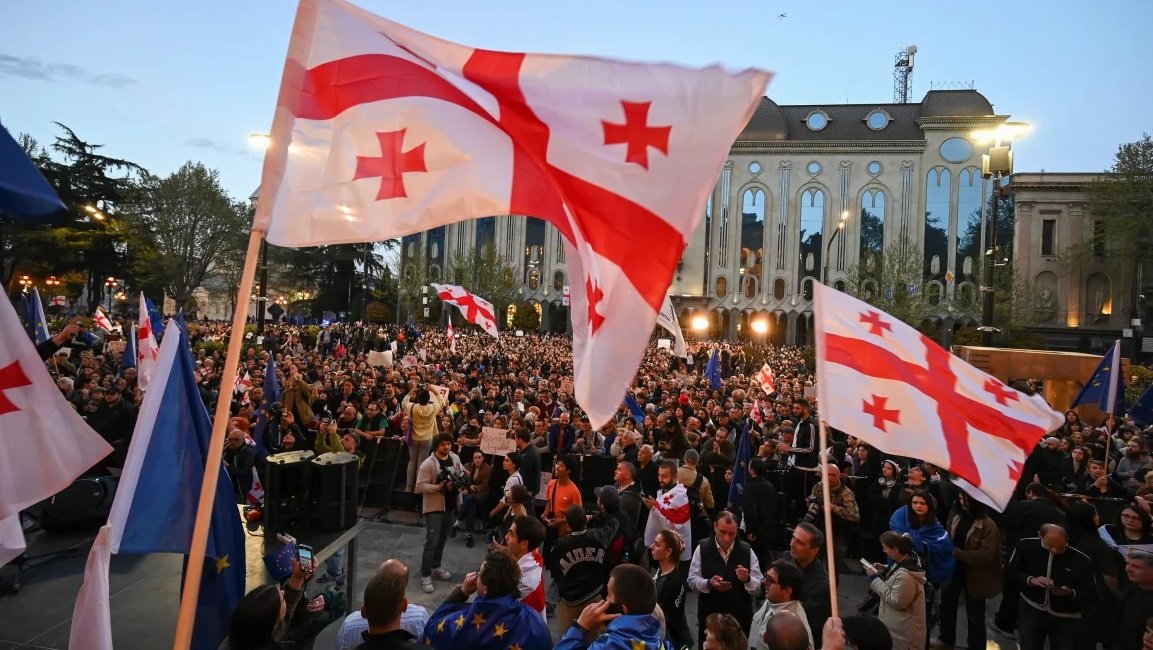Young Georgians want to be part of Europe. Their government is in the way.
A proposed “foreign agent” law could block the country’s path to the E.U. and NATO.
The future of another former Soviet republic, Georgia, is at a critical moment. As in Ukraine, many citizens, particularly younger people, want closer ties to Europe and freedom from Russian tyranny. But young Georgians confront a government ruled by the Georgian Dream party, founded by former prime minister and oligarch Bidzina Ivanishvili, which seeks alignment with Russia. This conflict has come to a head, as Georgia’s vibrant civil society groups have filled the streets with protests against a proposed law, borrowed from Vladimir Putin’s Russia, designed to crack down on government opposition.
The Georgian Dream party last month renewed its push for a punitive “foreign agent” law like the one Mr. Putin imposed on his people in 2012. The draft law, awaiting final votes in Georgia’s Parliament, would require nongovernmental groups and media outlets that receive more than 20 percent of their funding from abroad to register as organizations “carrying the interests of a foreign power” and provide annual financial statements about their activity. Violators could be fined up to $9,000.
The law was proposed last year and then withdrawn by Georgian Dream in the face of mass demonstrations against it. Many critics say its purpose is to cripple civil society organizations before Georgia holds parliamentary elections in October.
Mr. Ivanishvili left no doubt about his intentions during a speech on Monday in Tbilisi. He railed against a sinister “global war party” that he said has been “appointed from outside.” He claimed it was attempting to take control of Georgia by funding nongovernmental organizations, or NGOs. He declared that the outsiders were behind the tumultuous presidency of Mikheil Saakashvili, who served from 2004 to 2013, and whom the current government has imprisoned on spurious charges. According to an account of Mr. Ivanishvili’s remarks recorded by the group Civil Georgia, he also attacked NGOs as being a “pseudo elite,” adding, “They have no homeland; they do not love their country or their people because they do not really consider them to be their own. On the contrary, such people are embarrassed by their country and its people.”
This description of NGOs is twisted and false, but hardly original. Ever since Mr. Putin used Russia’s law to crack down on independent civil society, at least 60 nations have passed or drafted laws designed to restrict NGOs, and 96 carried out other policies curtailing them, imposing cumbersome registration requirements, intrusive monitoring, harassment and shutdowns. The laws were largely borrowed from Russia, their details documented in the Civic Freedom Monitor of the International Center for Not-for-Profit Law.
Georgia’s opposition recognized the “foreign agent” law could easily become a roadblock to the country’s accession to the European Union and NATO. Last December, Georgia was given candidate status for E.U. membership, but to acquire full membership, Georgia needs to demonstrate a clear commitment to the bloc’s values and reform. The E.U. emphasized that “proper functioning of democratic institutions and reforms related to justice and the rule of law are a priority” for Georgia.
A key feature of last year’s protests was a younger generation that strongly desires a future linked to Europe and not to Russia. Young Georgians have been back on the streets in recent days. Though the immediate issue is the foreign-agent law, the question of Europe looms large. “The whole younger generation is in favor of European integration. Our number one priority is to be part of NATO and the European Union,” a member of Parliament, Khatia Dekanoidze, told us.
In an April 26 letter, a bipartisan group of 14 senators, led by Jeanne Shaheen (D-N.H.) and James E. Risch (R-Idaho), pointed out that the United States has a strong interest in Georgia’s democracy and nongovernmental organizations continuing to thrive. The letter noted that the foreign-agent law is aimed primarily at aid from the United States and Europe, that it is “at odds with E.U. norms and values and will impact your country’s membership path.” The senators warned that passage of the law could lead to a shift in U.S. policy toward sanctions on those interfering with Georgia’s democracy.
The Georgian dream should be escaping from Russia’s ruinous grasp, in common cause with a free and prosperous West. This will not happen if the Georgian Dream party gets its way.



